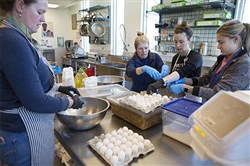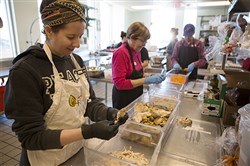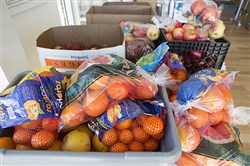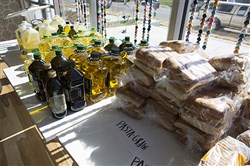VOL. 44 | NO. 11 | Friday, March 13, 2020
Chicken potpies for storm-scarred souls
By Catherine Mayhew
The staff of the Nashville Food Project sat in the darkened conference room at their headquarters in The Nations hours after the March 3 tornado. The power was still out from the horrific tornado that hit North Nashville, Germantown, East Nashville and beyond, cutting a swath of destruction and death that left its victims devastated and Nashville in a state of disbelief.
The singular question: How to feed thousands of people who 24 hours earlier weren’t worried about where their next meal was coming from?
Scores of Nashville nonprofits faced similar questions in their own spaces, whether they normally offered housing, volunteers, household goods or other services. This was a disaster with a beginning in the early morning hours of Tuesday, a middle in the days following when victims began to assess the damage and their own uncertain futures and an end that would not really be in sight for months and possibly years.
For the Food Project, which normally supplies meals to the food insecure, it began by taking a deep breath.

Volunteers April Parker, left, Elizabeth Stein, Megan Hogue and Samantha Mitton help prepare banana bread in the Nashville Food Project kitchen.
-- Photos By Michelle Morrow |The Ledger“I think the very first day, we spent almost the whole day planning, which is frustrating because you want to just immediately jump in,” says Jennifer Justus, the marketing and events manager. “It’s just not the way that we operate. We’re not just going to throw up a card table and start serving food. We knew that there needed to be structure in place before we really made it happen.”
The Project updated its website often as volunteers clamored to help.
“We are listening to our partners and local emergency management services to coordinate and activate a sustained response effort that we expect to stretch long into the coming days and weeks,” wrote CEO Tallu Schuyler Quinn. “As many of you know, a helpful, coordinated relief effort takes a bunch of layers of communication with many partners and key stakeholders, so thank you in advance for your patience and all your tremendous support.”

Betsy Trabue and her mother, Ramona Trabue, of Franklin help shred some chicken for chicken potpies. This is their first time volunteering with The Nashville Food Project.
One immediate response came in the form of gourmet chicken salad. The Project’s catering team, led by Katie Duiven, had prepared it along with a garden salad, fruit, baguettes and dessert for a nonprofit client’s volunteer party for 350. The agency postponed the event after the tornadoes struck, paid the bill and then told the Project to redistribute the food to relief centers. Victims who perhaps hadn’t eaten for almost a day found sustenance.
Planning the next steps was calm and intentionally done. Grace Biggs, the impact manager, and Elizabeth Langgle-Martin, the community engagement manager, have deep ties in the community and began reaching out.
“They have lots of really great connections with other partners, especially in the areas most affected,” Development Director Teri Forsythe Sloan says. “Starting Tuesday morning, they went to work, calling every community organizer they know, every church they know, every organization they know to figure out where the places would be best served by receiving our meals.”

Bags of oranges and apples along with paper goods and cooking oils are just some of the items people have donated to the food project location.
In coordination with the Mayor’s Office and others, The Project settled on shelters and established community hubs where residents in a neighborhood would naturally turn for help.
With a well-planned response in place, The Project called in volunteers and community donors.
Just days into the disaster response the kitchen at 5904 California was buzzing with activity.
Brent Peadro, the kitchen manager, had laid out cutting boards and knives on the stainless steel work tables along with bushels of onions, sweet potatoes, celery and tomatoes that would go into the various dishes the Project will produce to send out into the community. Volunteers, who had signed up for the shift on the Project’s website, meticulously washed up and put on rubber gloves before beginning hours of peeling and chopping.
Peadro had scarcely stopping moving for four days straight while Chef Director Bianca Morton had her cellphone seemingly permanently affixed to her ear for just as long, coordinating the massive relief effort. It was a grueling week that also included a long-planned marathon of sorting and storing 28,000 pounds of meat from the Meat Conference at Gaylord Opryland along with other staff.
Meanwhile, Holli Edmonds, an administrative assistant who normally checks in volunteers at the Project’s main entrance, coordinated receiving pounds and pounds of food donations from the community sparked by the Project’s wish list on the website.
“As soon as everything happened, we kept getting emails and phone calls,” Edmonds says. “‘What can I do to help?’

Bread, hotdog buns and cooking oil are a few items that people have donated to the center.
“So we put together our list of most needed items. And people have just really shown up. I’ve been here in the office the past two days, and (I’ve met) people who I’ve never seen before; people who are just in the neighborhood who just saw things on social media.”
The Food Project also is supplying crews working on restoring power with meals.
“NES has brought in tons of workers from nearby regional utility companies,” Forsythe Sloan says. “They needed extra help. We’ve been providing sack lunches and things like that for those folks so they can stay fueled to work.”
And so it goes all over Nashville.
Hands on Nashville supplies volunteers, and its website crashed three times Tuesday with all the people who wanted to lend a hand. The Community Resource Center, the materials manager for the disaster, turned its parking lot into a makeshift outdoor donations center the response was so great. It’s 5,000-square-foot warehouse was nearing capacity. And the Community Foundation, which manages monetary donations in good times and bad, received more than $2.1 million for its Middle Tennessee Emergency Response Fund in just 36 hours.
All these agencies are focused on the now, but also on the future. The road to recovery will be long. Some volunteers’ enthusiastic desire to help will wane. A week or two from now, fewer will step forward. In a few months, when the really hard work of rebuilding will start in earnest, the horrific tornadoes that preyed on Middle Tennessee will be fading into memory. But the work of the Food Project and other boots-on-the-ground nonprofits will continue.
“Life often delivers both beauty and chaos together,” wrote Schuyler Quinn in a message to the community published on its website. “I do not understand why life unfolds this way, but stand in awe of the hope and love and connections that emerge when unexpected loss rips through our community.”